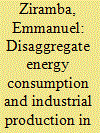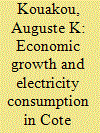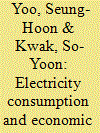|
|
|
Sort Order |
|
|
|
Items / Page
|
|
|
|
|
|
|
| Srl | Item |
| 1 |
ID:
093470


|
|
|
|
|
| Publication |
2010.
|
| Summary/Abstract |
This paper attempts to examine the dynamic relationship between economic growth, nuclear energy consumption, labor and capital for India for the period 1969-2006. Applying the bounds test approach to cointegration developed by Pesaran et al. (2001)we find that there was a short- and a long-run relationship between nuclear energy consumption and economic growth. Using four long-run estimators we also found that nuclear energy consumption has a positive and a statistically significant impact on India's economic growth. Further, applying the Toda and Yamamoto (1995)approach to Granger causality and the variance decomposition approach developed by Pesaran and Shin (1998) we found a positive and a significant uni-directional causality running from nuclear energy consumption to economic growth without feedback. This implies that economic growth in India is dependent on nuclear energy consumption where a decrease in nuclear energy consumption may lead to a decrease in real income. For a fast growing energy-dependent economy this may have far-reaching implications for economic growth. India's economic growth can be frustrated if energy conservation measures are undertaken without due regard to the negative impact they have on economic growth.
|
|
|
|
|
|
|
|
|
|
|
|
|
|
|
|
| 2 |
ID:
098054


|
|
|
| 3 |
ID:
113468


|
|
|
|
|
| Publication |
2012.
|
| Summary/Abstract |
This study examines the causal relationship between diesel consumption and economic growth in Cameroon by using a three-step modern time-series technique. Tests for unit roots, cointegration, and Granger-causality based on error correction model are employed on annual data covering the period 1975-2008. Empirical results of the study confirm the presence of a long-run equilibrium relationship between diesel consumption and economic growth. The error correction model shows that an estimated 1% increase in economic growth causes a rise in diesel consumption of 1.30% in the long-run. The overall results show that there exists bidirectional causality in the long-run relationship and no causality in the short-run relationship between diesel consumption and economic growth at the 5% level of significance. Thus, the energy policies in Cameroon should place priority on the discovery of new oil field and building capacity additions of the refinery to increase production of petroleum products, as this would propel the economic growth of the country.
|
|
|
|
|
|
|
|
|
|
|
|
|
|
|
|
| 4 |
ID:
132763


|
|
|
|
|
| Publication |
2014.
|
| Summary/Abstract |
This paper explores the relationship between trade openness and energy consumption using data of 91 high, middle and low income countries. The study covers the period of 1980-2010. We have applied panel cointegration to examine long run relationship between the variables. The direction of causal relationship between trade openness is investigated by applying Homogenous non-causality, Homogenous causality and Heterogeneous causality tests.
Our variables are integrated at I(1) confirmed by time series and panel unit root tests and cointegration is found between trade openness and energy consumption. The relationship between trade openness and energy consumption is inverted U-shaped in high income countries but U-shaped in middle and low income countries. The homogenous and non-homogenous causality analysis reveals the bidirectional causality between trade openness and energy consumption. This paper opens up new insights for policy makers to design a comprehensive economic, trade and policies for sustainable economic growth in long run following heterogeneous causality findings.
|
|
|
|
|
|
|
|
|
|
|
|
|
|
|
|
| 5 |
ID:
152098


|
|
|
|
|
| Summary/Abstract |
he study of civil war has increased exponentially during the post-cold war period. This has not, however, resulted in greater levels of consensus with regard to the causes and nature of this phenomenon. In order to alleviate this situation the current article will draw on critical realist philosophy. It will argue (1) that critical realism provides conflict studies authors with a more sophisticated and coherent understanding of causality than has previously been available to them, and (2) that this understanding paves the way for an approach to social science which – rather than consistently abstracting from context – systematically engages with it.
|
|
|
|
|
|
|
|
|
|
|
|
|
|
|
|
| 6 |
ID:
098335


|
|
|
|
|
| Publication |
2010.
|
| Summary/Abstract |
This paper revisits the defence-growth nexus for the rivals of the Israeli-Arab conflict over the last four decades. To this end, we utilize the Toda and Yamamoto (1995) causality test and the generalized variance decomposition. Contrary to the conventional wisdom and many earlier studies, we fail to detect any persistent adverse impact of military expenditures on economic growth. Our conclusions are kept intact even when we account for the possibility of endogenous structural breaks and during the post-1979 peace treaty period. Our findings imply insignificant peace dividends once the conflict is resolved and the military spending is cut to internationally acceptable standards.
|
|
|
|
|
|
|
|
|
|
|
|
|
|
|
|
| 7 |
ID:
088219


|
|
|
|
|
| Publication |
2009.
|
| Summary/Abstract |
This paper tries to assess the relationship between disaggregate energy consumption and industrial output in South Africa by undertaking a cointegration analysis using annual data from 1980 to 2005. We also investigate the causal relationships between the various disaggregate forms of energy consumption and industrial production. Our results imply that industrial production and employment are long-run forcing variables for electricity consumption. Applying the [Toda, H.Y., Yamamoto, T., 1995. Statistical inference in vector autoregressions with possibly integrated processes. Journal of Econometrics 66, 225-250] technique to Granger-causality, we find bi-directional causality between oil consumption and industrial production. For the other forms of energy consumption, there is evidence in support of the energy neutrality hypothesis. There is also evidence of causality between employment and electricity consumption as well as coal consumption causing employment.
|
|
|
|
|
|
|
|
|
|
|
|
|
|
|
|
| 8 |
ID:
119263


|
|
|
|
|
| Publication |
2013.
|
| Summary/Abstract |
This study revisits the relationship between defence spending and economic growth via a Keynesian model in Pakistan using the autoregressive distributive lag bounds testing approach to cointegration. Empirical evidence suggests a stable cointegration relationship between defence spending and economic growth. An increase in defence spending reduces the pace of economic growth confirming the validity of Keynesian hypothesis in this case. Current economic growth is positively linked with economic growth of previous periods while a rise in non-military expenditures boosts economic growth. Interest rate is inversely associated with economic growth. Finally, unidirectional causality running from military spending to economic growth is found.
|
|
|
|
|
|
|
|
|
|
|
|
|
|
|
|
| 9 |
ID:
161485


|
|
|
|
|
| Summary/Abstract |
The aim of this article is to empirically shed light on the impacts of trade openness (TO) on facilitation of renewable energy transition (RET) across Bangladesh, India, Pakistan, Sri Lanka and Nepal. Against this backdrop, this article incorporated annual time series data stemming from 2000 to 2017 and employed the two-stage least squares (2SLS) panel data estimation methodology. In addition, the panel Granger causality test was also applied to distinguish the possible long-run causal associations between the variables considered in the regression models. In the light of the estimated results, it is found that an improvement in TO triggers renewable energy consumption, improves the primary energy-use efficiency and elevates the access to clean cooking fuel technology within the selected South Asian economies. However, the results also led to the concerning conclusion regarding the ineffectiveness of the trade liberalization policies in curbing the relative consumption of non-renewable energy resources, thereby marginalizing the prospects of overall RET within these economies.
|
|
|
|
|
|
|
|
|
|
|
|
|
|
|
|
| 10 |
ID:
105783


|
|
|
|
|
| Publication |
2011.
|
| Summary/Abstract |
This paper examines the causal relationship between the electric power industry and the economic growth of Cote d'Ivoire. Using the data from 1971 to 2008, a test was conducted for the cointegration and Granger causality within an error correction model. Results from these tests reveal a bidirectional causality between per capita electricity consumption and per capita GDP. A unidirectional causality running from electricity consumption to industry value added appears in the short run. Economic growth is found to have great effects on electricity consumption and a reverse causality from electricity to economic growth may also appear. In the long run, there is a unidirectional causality between electricity and both GDP and industry value added. From these findings, we conclude that the country will be energy dependent in the long run and must therefore secure the production network from shortfalls to ensure a sustainable development path. Accordingly, government should adopt policies aimed at increasing the investment in the sector by stepping up electricity production from existing and new energy sources.
|
|
|
|
|
|
|
|
|
|
|
|
|
|
|
|
| 11 |
ID:
119803


|
|
|
|
|
| Publication |
2013.
|
| Summary/Abstract |
This article addresses the issue of electricity consumption, petroleum price and economic growth in Algeria. The primary objective is to investigate and analyze the causal relationship between electricity consumption (EC), Brent oil price (BOP) and economic growth (GDP) for Algeria over the period of 1971-2010. To examine short-run, long-run and joint causality relationships we used a multivariate cointegration approach based on the recent advances in time series econometrics (e.g., Zivot-Andrews test; Gregory-Hansen cointegration test; Vector Error Correction Models (VECM)). The empirical results show that there is evidence of short-run and a strong long-run bi-directional causal relationship between EC and real GDP in Algeria. Findings indicate also the absence of causal relationship between BOP and EC. Our empirical findings support the idea that there a link between electricity consumption and economic growth and disproves the neo-classical assumption referred to as the "neutrality hypothesis".
|
|
|
|
|
|
|
|
|
|
|
|
|
|
|
|
| 12 |
ID:
093482


|
|
|
|
|
| Publication |
2010.
|
| Summary/Abstract |
This paper attempts to investigate the causal relationship between electricity consumption and economic growth among seven South American countries, namely Argentina, Brazil, Chile, Columbia, Ecuador, Peru, and Venezuela using widely accepted time-series techniques for the period 1975-2006. The results indicate that the causal nexus between electricity consumption and economic growth varies across countries. There is a unidirectional, short-run causality from electricity consumption to real GDP for Argentina, Brazil, Chile, Columbia, and Ecuador. This means that an increase in electricity consumption directly affects economic growth in those countries. In Venezuela, there is a bidirectional causality between electricity consumption and economic growth. This implies that an increase in electricity consumption directly affects economic growth and that economic growth also stimulates further electricity consumption in that country. However, no causal relationships exist in Peru. The documented evidence from seven South American countries can provide useful information for each government with regard to energy and growth policy.
|
|
|
|
|
|
|
|
|
|
|
|
|
|
|
|
| 13 |
ID:
125782


|
|
|
|
|
| Publication |
2013.
|
| Summary/Abstract |
This paper attempts to cast light into the relationship between electricity consumption and economic growth in Greece in a multivariate framework. For this purpose we used cointegration techniques and the vector error correction model in order to capture short-run and long-run dynamics over the sample period 1970-2011. The empirical results reveal that in the long-run electricity demand appears to be price inelastic and income elastic, while in the short-run the relevant elasticities are below unity. We also argue that the causal relationship between electricity consumption and economic growth in Greece is bi-directional. Our results strengthen the notion that Greece is an energy dependent country and well directed energy conservation policies could even boost economic growth. Furthermore, the implementation of renewable energy sources should provide significant benefits ensuring sufficient security of supply in the Greek energy system. This evidence can provide a new basis for discussion on the appropriate design and implementation of environmental and energy policies for Greece and other medium sized economies with similar characteristics.
|
|
|
|
|
|
|
|
|
|
|
|
|
|
|
|
| 14 |
ID:
109644


|
|
|
|
|
| Publication |
2011.
|
| Summary/Abstract |
In this paper, an attempt is being made to examine the causal relationship between per capita electricity consumption and per capita GDP of Bangladesh using the vector error correction specified Granger causality test to search their short-run, long-run and joint causal relationships for the period of 1971-2008. Empirical findings reveal that there is a short-run unidirectional causal flow running from per capita electricity consumption to per capita GDP without feedback. The presence of a positive short-run causality explains that an increase in electricity consumption directly affects economic activity in Bangladesh. Likewise, results from joint causality exhibit the same as in short-run. By contrast, long-run results show a bi-directional causality running from electricity consumption to economic growth with feedback. These findings can provide essential policy insights to design immediate and long-term growth prospect for Bangladesh keeping in mind its present planned growth strategy and dismal power and energy sector.
|
|
|
|
|
|
|
|
|
|
|
|
|
|
|
|
| 15 |
ID:
105771


|
|
|
|
|
| Publication |
2011.
|
| Summary/Abstract |
The aim of this paper is to re-examine the relationship between electricity consumption, economic growth, and employment in Portugal using the cointegration and Granger causality frameworks. This study covers the sample period from 1971 to 2009. We examine the presence of a long-run equilibrium relationship using the bounds testing approach to cointegration within the Unrestricted Error-Correction Model (UECM). Moreover, we examine the direction of causality between electricity consumption, economic growth, and employment in Portugal using the Granger causality test within the Vector Error-Correction Model (VECM). As a summary of the empirical findings, we find that electricity consumption, economic growth, and employment in Portugal are cointegrated and there is bi-directional Granger causality between the three variables in the long-run. With the exception of the Granger causality between electricity consumption and economic growth, the rest of the variables are also bi-directional Granger causality in the short-run. Furthermore, we find that there is unidirectional Granger causality running from economic growth to electricity consumption, but no evidence of reversal causality.
|
|
|
|
|
|
|
|
|
|
|
|
|
|
|
|
| 16 |
ID:
111371


|
|
|
|
|
| Publication |
2012.
|
| Summary/Abstract |
In conventional causality testing based on asymptotic distribution theory, there is a high risk of wrongly rejecting the true null of no causality especially when the sample size is as small as typically seen in the literature. In this study, we offer a formal diagnosis of the existing contradictory results on the causal relationship between energy consumption and real GDP. We also employ a time series oriented advanced data generation process to perform simulation based inference for the People's Republic of China. Our study covers the 1971-2007 period and considers five different aggregated and disaggregated energy consumption measures as well as three different lag orders in both a bivariate as well as a multivariate frameworks. Our maximum entropy bootstrap based analysis, which avoids pretest biases and is also robust to Type I errors, supports the neutrality hypothesis in 53 out of the total of 60 model estimations. The strong results show that coarse aggregate data has a limited potential to observe the complex causal linkages between energy consumption and economic growth. Future policy oriented research on this nexus requires more focused analyses based on sectoral and provincial data.
|
|
|
|
|
|
|
|
|
|
|
|
|
|
|
|
| 17 |
ID:
117014


|
|
|
|
|
| Publication |
2012.
|
| Summary/Abstract |
Unlike previous energy consumption-economic growth studies, this study examines the relationship among energy consumption, economic growth, employment and gross fixed capital formation for 17 highly developed OECD countries by employing both the Toda-Yamamoto procedure which based on asymptotic critical values and the bootstrap-corrected causality test, since non-normality of the error term harms the validity of the Toda-Yamamoto procedure. This study finds that there is very small bias due to the assumption of normality. Furthermore using different information criterions, importance of lag length is tested. Findings indicate that selection of lag length is important for Denmark, Ireland, Norway and Spain. It is concluded that while there exists uni-directional causality running from energy consumption to real GDP for Japan, bi-directional causality is found for Italy, New Zealand, Norway and Spain. On the other hand, uni-directional causality from GDP to energy is found for Australia, Canada and Ireland whereas no causal nexus is found for all of other nine countries. Our analyses covering the sample periods imply that Japan, Italy, New Zealand, Norway and Spain should not follow energy conservation policy at the aggregated level, since the reduction of energy damages the economic growth.
|
|
|
|
|
|
|
|
|
|
|
|
|
|
|
|
| 18 |
ID:
115170


|
|
|
|
|
| Publication |
2012.
|
| Summary/Abstract |
Following the importance of energy in the agrarian economies, the investigation of the causal relationship between energy consumption in agriculture sector and economic growth has a fundamental role in implementing suitable policies. This paper examines the causal relationship between energy consumption and agricultural value added, controlling for trade openness, in Tunisia from 1980 to 2007. The relationship is investigated at aggregated as well as disaggregated components of energy consumption, including oil and electricity. Using Granger's technique, it is shown that various results are obtained regarding the direction of causality between competing variables. Nevertheless, the most common finding suggest that trade openness and both aggregated and disaggregated energy consumption Granger causes agricultural value added. Therefore, the energy-led growth and trade-led growth hypotheses are supported in the Tunisian agriculture sector. An important policy implication resulting from this study is that energy can be considered as a limiting factor to agriculture value added and, therefore, shocks to energy supply would have a negative impact onto agriculture performance. Furthermore, trade liberalization seems to be a stimulus factor to the Tunisian agriculture development.
|
|
|
|
|
|
|
|
|
|
|
|
|
|
|
|
| 19 |
ID:
173125


|
|
|
|
|
| Summary/Abstract |
“The Soldier, the State, and the People—Costs and Benefits of Military Regimes”: Evaluating the Essay “Guns and Butter: Child Mortality and the Mediators of Militarization” raises several concerns about the theory and analyses in our article. We address what we see as the three most important: (1) the necessity of both qualitative and quantitative analyses in the study of militarization; (2) correlational versus causal analysis; and (3) the value of Huntington’s analysis of praetorian militarization. We have varying levels of agreement.
|
|
|
|
|
|
|
|
|
|
|
|
|
|
|
|
| 20 |
ID:
096138


|
|
|
|
|
| Publication |
2010.
|
| Summary/Abstract |
The study probes cointegration and causality between carbon emissions and economic growth for India using ARDL bounds testing approach complemented by Johansen-Juselius maximum likelihood procedure in a multivariate framework by incorporating energy supply, investment and employment for time span 1971-2006. The study fails to establish long-run equilibrium relationship and long term causality between carbon emissions and economic growth; however, there exists a bi-directional short-run causality between the two. Hence, in the short-run, any effort to reduce carbon emissions could lead to a fall in the national income. This study also establishes unidirectional short-run causality running from economic growth to energy supply and energy supply to carbon emissions. The absence of causality running from energy supply to economic growth implies that in India, energy conservation and energy efficiency measures can be implemented to minimize the wastage of energy across value chain. Such measures would narrow energy demand-supply gap. Absence of long-run causality between carbon emissions and economic growth implies that in the long-run, focus should be given on harnessing energy from clean sources to curb carbon emissions, which would not affect the country's economic growth.
|
|
|
|
|
|
|
|
|
|
|
|
|
|
|
|
|
|
|
|
|